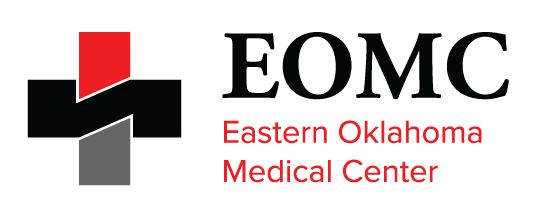Pet Visitation

Advantages to Pet Visitation
Health care professionals realize that the emotional and psychological needs of patients are as important as physical needs. All three must be maintained in balance for the true healing to take place. Pets can serve many important functions to benefit well being. A pet can be a person’s “significant other.” Because speech is not necessary to interact with animals, pets may be particularly beneficial for patients who have difficulty communicating.
Research shows that pet visits may significantly improve morale and possibly lower blood pressure levels in some people. Eastern Oklahoma Medical Center is supportive of pet visitation as an ongoing commitment to quality health care for its patients.
A Note on Pet Safety
The hospital environment may pose some potential hazards for the pet. The animal may be susceptible to catching certain viral infections from humans. Other hazards include potential exposure to a variety of chemicals necessary for the hospital to function. Review the overall health of the animal carefully before considering pet visitation. The guidelines and regulations of this program have been written with the well-being of the pet and patient in mind.
The Pet’s Point of View
Often times, people under estimate the depth of the bond between a person and an animal. When an individual is admitted to the hospital, the pain of separation may be felt by both the pet and the owner. A pet’s morale may improve with a visit to its owner. However, it is important to remember that for some animals, the end of the visit may rekindle or heighten feelings of separation.
The hospital environment is certainly one that few animals have ever encountered. New smells, loud noises, different surfaces, and crowds of unknown people may present a challenge for even the most docile pet. Increased stress may be noticed in pets trying to cope with unfamiliar surroundings. Pet visits can also be tiring for the animal and should not be combined with other outings.
Before a pet can visit in the hospital, the owner must designate a handler for the animal. The owner and handler must read all the visitation guidelines and sign a waiver.
- Registered Service Animals are exempt from the guidelines of this program.
- The program pertains to domestic dogs and cats over the age of 2 years.
- Animal must be housebroken.
- Birds and reptiles are specifically prohibited.
- No more than one pet is allowed per visit.
- Pets are not allowed to visit patients who are on isolation or other special precautions.
- Pets are allowed int he atrium area only and not in the patient rooms or other areas of the hospital.
- Generally, visits are limited to 1 hour a day.
- The handler must have the Visiting Animal Health Form filled out by their Veterinarian and returned to the Infection Preventionist no less than 24 hours prior to the planned visit.
- Visits must be prearranged with the nursing staff after clearance from the Infection Preventionist.
- Remember to bring a leash or carrier.
- Walk the animal and allow it to urinate and/or defecate before entering the hospital. The handler is responsible for cleaning up after the animal while on hospital grounds.
- Pet must be leashed or in a carrier before entering the hospital and remain on a leash at all times during the visit.
- Entrance to the hospital will be made at the atrium door ONLY. This is located to the right of the main hospital entrance, off Wall Street.
- Try to avoid excessive contact between the animal and other patients, staff, and visitors.
- During the pet’s visit, the handler must remain with the animal at all times.
- Pet must be kept under control at all times.
- If an accident occurs while inside the hospital, the handler should use paper towels to clean up as much as possible and report the incident to the nurse. The housekeeping staff will complete the cleaning process.
- The pet visit will be ended if the animal exhibits any behavioral problem (excessive barking, growling, hissing, scratching, biting, etc.), has an accident, or if there are signs of poor grooming, illness, or infestations.
- Pets are required to be on a leash at all times.
- Visiting pets are not allowed to use the front entrance of the building.
- Pet visits are encouraged to occur in the Atrium, however, the courtyard may be utilized if the patient’s condition allows.
For more information on pet visitation, please call (918) 635-3322.
Please Note: EOMC reserves the right to deny any animal entry to the hospital if the animal is deemed unsuitable for pet visitation or if preparation for the pet visit is not complete.
